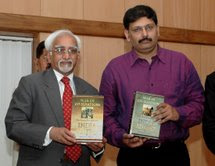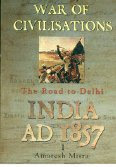VICE PRESIDENT RELEASES BOOK ‘WAR OF CIVILIZATIONS : INDIA AD 1857

The Vice President of India Shri Mohd. Hamid Ansari released the book titled “War of Civilizations: India AD 1857” –(Volume I -The Road to Delhi; & Volume II- The Long Revolution) authored by the writer/journalist Shri Amaresh Misra at a function here today. Addressing on the occasion, the Vice President said that writing such a voluminous book is an extraordinary success. Referring to the sources in the book he said that these sources are well-authenticated. He said that 1857 revolt was a revolution which failed because it was not sufficiently organized and many people did not join it. Congratulating the author the Vice President said that he has done a great service to the nation. The book showcases a West, the West has never seen, an Asia which Asians are unaware of and a story of the ‘Indian Mutiny’ which has never been told before. The whole Asia-Europe conflict gets a new slant. Accessible to scholars, historians, lay readers, students of military adventure and battles, ideo...

